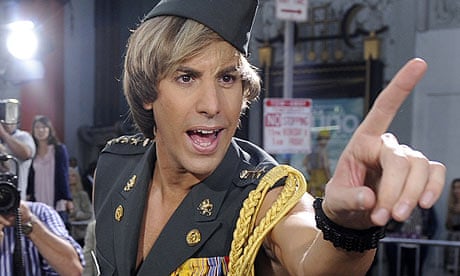On the off-chance that there still remain some American demi-celebrities and pundits as yet unpunk'd, British situationist-hoaxer Sacha Baron Cohen has returned with a new and horrifying creation. Now, this may not be every bit as funny as Borat and the latest film is - I admit it - a little further compromised by worries over fakery. Furthermore, at the very end, there is a disappointing parade of smirking A-listers treated with dismaying leniency and deference.
But this film is still howlingly funny, staggeringly rude, brutally incorrect and very often just brilliant. It has some really extraordinary, confrontational moments that live on in my traumatised mind in a continuous loop. Before this, I had thought Michael Haneke was the only figure of world cinema with the power to knot up my intestines in horror. But Baron Cohen has done something comparable. His new persona is Bruno, the gay Austrian TV fashion journalist with the impossible umlaut: flamboyant, blond, emotionally generous yet vulnerable and still only 19 years old.
Bruno is fired from his TV programme Funkyzeit Mit Bruno for disgracing himself backstage at the Milan shows where his self-created velcro outfit had stuck to the curtain and caused a fashion incident. In an angry and turbulent state, Bruno sensationally denounces the fashion world as "shallow" and flounces off to LA, base camp for his assault on the Everest of celebrityhood. To gain headlines, Bruno tries to solve the Middle East's woes by dressing as a gay Orthodox Jew in Jerusalem; with tough love on his mind, Bruno tells an al-Aqsa Martyrs Brigade commander that his hair is "sun-damaged"; he adopts an African baby and imperiously tells an astonished and largely black daytime TV audience that the correct term for his child is "African-American". He devises a TV show in which his urethra pouts the word "Bruno" and finally realises that to gain acceptance he will have to become straight like his heroes: Tom Cruise, Kevin Spacey and John Travolta.
Fans of Baron Cohen's first creation, Ali G, will have found the press coverage of Bruno thus far familiar: just as Ali G received an initial accusation of racism, and then almost instantly enjoyed a colossal frontlash of praise on the grounds that he was in fact satirising the white world's appropriation of black culture, so Bruno was first criticised as homophobic, the prelude to a lavish celebration for having confronted homophobia. And Bruno's hoaxes certainly expose some breathtakingly shabby bigotry and ignorance, and he hilariously makes some prejudiced idiots look thoroughly silly. It's an unimpeachably progressive cake he's got there - but munched down with some outrageously queeny camp gags on the side.
But even this might not quite be the point. At the beginning of the movie, Bruno has a session in which he decides what's hot and what's not: what "in" and what's "aus". And what's in, he says, is "autism". Autism? Well, Baron Cohen's cousin is Simon Baron-Cohen, a world-renowned expert on autism, so as well as being a typically outrageous gag, that moment could be a tiny, almost subliminal tribute to the famous academic in his family. But perhaps Bruno's behaviour itself tells us why autism is "in". In the comic nightmare of his personal world, Bruno has an extraordinary inability to understand how he is being perceived, and how to relate to other people. Now, this newspaper takes a pretty dim view of journalists casually caricaturing "autism" as a metaphor for selfishness or moral failing - but Baron Cohen could be using it for some characteristically non-PC satire on the psychological condition of celebrity-worship.
On then, to the fakery issue. The scene in which Bruno, having got a job as a movie extra, plays a member of a jury in a courtroom drama but can't keep his mouth shut ... this is probably faked. And the leather-clad woman who whips Bruno at the end of a hetero swingers party, with cartoon whiplash-cracks pasted on to the soundtrack, is almost certainly acting, and her scene is staged. (The other swinger-couples are probably real and this leather-dominatrix was presumably the "girlfriend" with whom Bruno gained admission to the party.)
But the film's most glorious scene is absolutely real. Bruno interviews Texas congressman and would-be US presidential candidate Ron Paul in his hotel suite, and then attempts to seduce him to create a sex tape that will kickstart his celebrity career. It is sublime. Baron Cohen's nerve is incredible; Paul's outrage and horror are unmistakably the real thing, and the mistaken-identity punchline is a classic. Did Baron Cohen and his writers, Dan Mazer, Pete Baynham, Anthony Hines and Jeff Schaffer, think of the punchline first and then sucker Paul into getting involved? Or did it occur to them later? Either way, it was inspired.
Famously, Ronald Reagan ordered the tune Edelweiss to be played when the Austrian president Rudolf Kirschläger visited the White House, believing it to be the Austrian national anthem. I suggest that the organisers of the Golden Globe ceremony start work now on a new funky arrangement of Edelweiss to play when Sacha Baron Cohen, creator of modern cinema's most notorious faux-strian, sashays up to receive his award.





